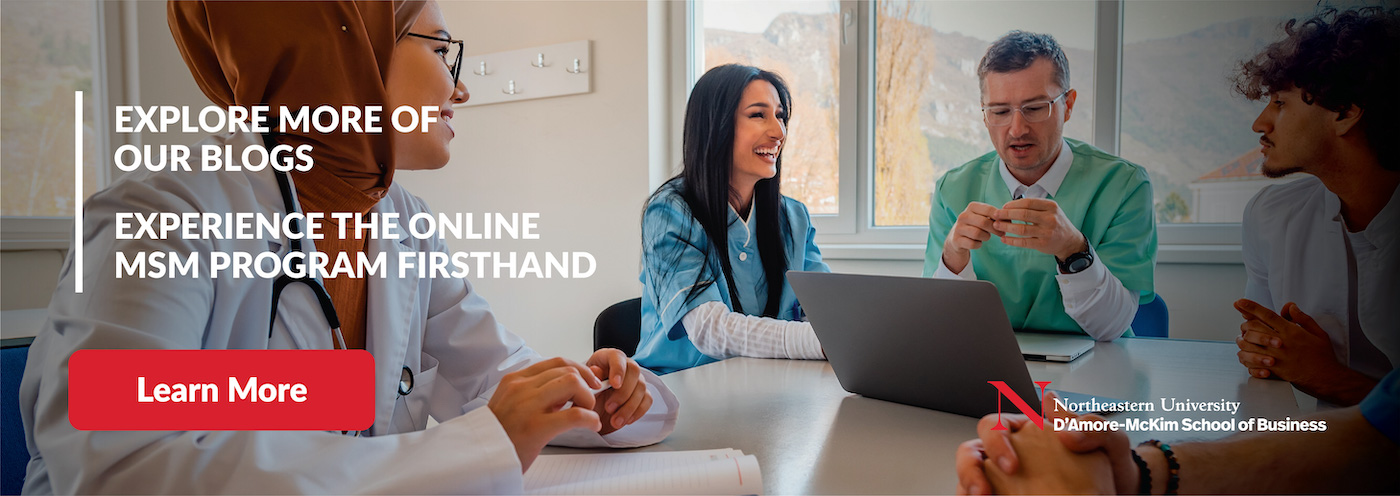Northeastern's Online MS in Management: Healthcare Administration Program is designed to provide deep insight into the individual elements of healthcare transformation and how the pieces integrate into strategic and tactical plans. Moreover, each course has students apply the frameworks and methods to their organizations, which is the basis of experiential learning. Learning, using, and helping your organization and career are the trifecta we seek to achieve in this program. Help your patients, your organization, and accelerate your careers.
Ironically, while healthcare is a humane service, the "care" aspect often gets lost in the voluminous practices and complex processes. That's where healthcare management steps in, bringing efficiency and compassion into the mix.
Ready to apply? Request an application fee waiver
What Is a Medical and Health Services Manager?
Healthcare remains a large, complex industry where business principles apply more than ever. And yet, a healthcare provider is not just a business but a business with a clear moral purpose. Healthcare providers help patients and serve their loved ones, they conduct research to find new cures for diseases, and innovate to develop new care protocols to help people get healthy and stay healthy. This shared purpose creates a cohort of healthcare industry professionals all of whom bring unique perspectives, create shared learning experiences, and further develop a career network.
Marc Meyer, Matthews Distinguished University Professor, and Faculty Director of this program, describes the complexity of healthcare innovation and delivery as running on two tracks:
“The first is to improve current operation for better outcomes and economics; and the second, to rethink and potentially obsolete old paradigms with significantly better ways to deliver care to an ever-diverse populations.” He adds, ‘And the infusion of AI and machine learning into clinical and diagnostic decision support systems is breathtaking. When combined with IoT for remote monitoring, AI will change how we think about many traditional aspects of healthcare delivery and economics. The time to innovate is now.”
In Northeastern's Online MS in Management: Healthcare Administration program, courses are provided for both tracks: managing the people, operations, and IT for today’s healthcare business and other courses for inventing and designing tomorrow’s healthcare systems and processes. The goal is to fine-tune administrative skills in areas such as managing people, IT, and supply chains and make students powerful, pragmatic innovators. Those who do both best will be tomorrow’s health industry leaders.
4 Ways a Master’s Degree in Management Can Improve Healthcare Administration
1. Develop Leadership Capabilities
Like skilled physicians who diagnose and then treat, Northeastern's Online MS in Management Program focuses on the healthcare enterprise, diagnosing process, IT, economic, and broader strategic and financial challenges. Students are taught methods to plan, propose, and execute specific initiatives to address these challenges. The goal is to make a tangible impact. Meyer aptly states, "Healthcare management professionals seek additional education because they want to learn and apply a diverse set of tools to tackle complex problems.” Mid-career professional students need courses in healthcare finance, health quality measurement, IT infrastructure, and process management to be effective. However, they all need courses in innovation, change management, patient management, and, if desired, AI and big data. And so do students earlier in their careers, including medical students, who need to know the enterprises they will join.
2. Analyze an Array of Healthcare Challenges
A manager with the analytical skills learned in the Online MS in Management Program will be equipped to tackle a broad range of specific challenges. For example, how to design a new clinical care process, make the business case for an IT project, or handle a complex multi-party negotiation. Then there are broader questions facing anyone managing healthcare today: understanding the implications of changing reimbursement structures, workforce design, and recruitment, or resolving fundamental ethical dilemmas at patient, employee, and societal levels.
3. Encourages Innovation
Northeastern's Online MS in Management: Healthcare Administration Program teaches anyone and everyone to be an innovator. Meyer notes, “We have students who process administrators' inpatient admission, in-hospital care, and discharge; others who manage IT; others, medication supply; and others, large physician and nursing staffs. Then, there are the diagnostic lab managers, pathologists, and even salespeople." Our students are clinicians and medical students with a keen interest in management. Every student learns how to innovate in various contexts: clinical processes, healthcare products or systems, administrative processes and technologies, and different forms of patient interaction. There are courses for each area, with applied projects in each course. “Think of us as a virtual innovation lab with kindred spirits. Come not just to learn but to innovate and make a difference,” said Meyer.
4. Offers Professional Guidance
The Program Faculty are both teachers and mentors for the students, including career pathway conversations and assistance selecting projects for various courses that can lead to potential job promotions over time. Even though this is an entirely virtual program, the faculty want to know the students truly – and help them. This is done through a set of live, interactive Zoom class sessions in each course, together with more intimate office hours directly with the faculty.
What to Look for in a Healthcare Management Degree Program
Embarking on a journey to pursue a degree in healthcare management is a pivotal step towards a rewarding and impactful career in the ever-evolving healthcare industry. However, with a multitude of programs available, selecting the right one requires careful consideration of various factors that contribute to a comprehensive and enriching educational experience.
The essential components that distinguish an exceptional healthcare management degree program are:
Faculty Expertise: The faculty for the Online MS in Management: Healthcare Administration Program are a combination of Northeastern Professors, Mayo clinical staff, and Professors of Practice either still in or recently retired from industry. Their respective networks are large and well-established. This makes for good teaching and insightful advice on class projects and career pathways.
Industry Network and Connections: The students and alumni of the Online MS in Management Program represent a rich professional network for new students. These include some of the largest healthcare systems in the country, others in different countries, medical equipment manufacturers, and pharmaceutical and data science companies. The amount of learning from one another is as significant as that from the teachers or the homework. And the network lasts long after the coursework is complete.
Action-Oriented Learning: Action learner encapsulates the concept of gaining hands-on experience. Meyer says, "Nearly all the courses have projects applied to the student’s organization. The projects are very important because they provide greater visibility in your organizations and pathways for enlarged responsibilities and promotion".
Career-Focused Curriculum: What's interesting about the future is that it's constantly changing. If you want a rewarding career in the healthcare industry, you’ll need to embrace the change, design it, and lead its implementation. Healthcare managers wear many hats – innovators, process managers, team leaders, and negotiators within and outside the organization. Combining an innovation-oriented mindset with a pragmatic, can-do, team-based approach to making new things happen – in large, bureaucratic organizations that have an enormous impact on individual lives and society.
A Master’s Degree in healthcare administration from Northeastern University is a foundational building block for an exciting, challenging career.
Get ready - an exciting journey awaits!
To learn more about the program and how it aligns with your interests, contact an admissions counselor for guidance.





